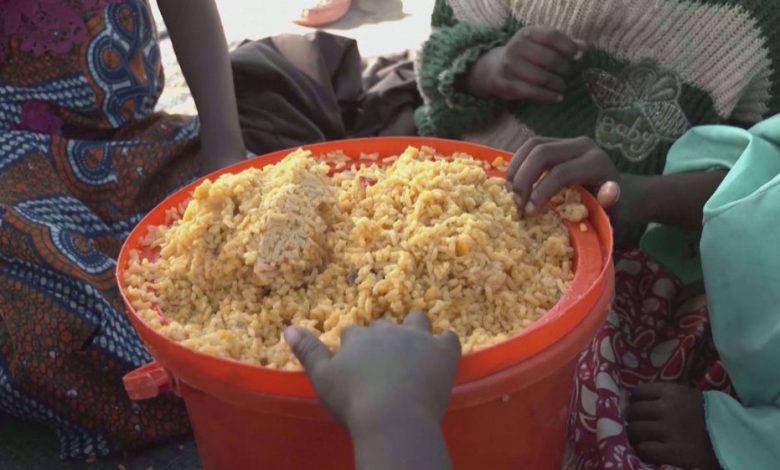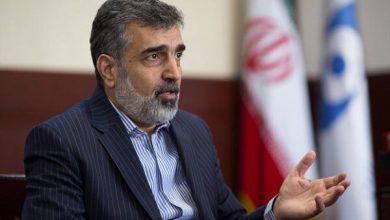Millions in Nigeria face food insecurity as flooding exacerbates existing hardships
Nigerians in northeastern Borno State are grappling with significant challenges as relentless price hikes and an intense insurgency exacerbate the struggle to provide for their families.

In September, a dam failure inundated the state capital and nearby agricultural areas, leaving numerous residents with limited alternatives for recovery.
Currently, displaced individuals, affected by the ongoing conflict between extremist insurgents and government forces, line up for aid in refugee camps. Once these supplies are exhausted, they often turn to seeking employment on nearby farms, where they face the peril of attacks by regional bandits.
Indo Usman is among the individuals receiving humanitarian food aid as she and her family take refuge in a sparse room within Gubio, an incomplete housing development originally intended for state government employees. Located approximately 96 kilometers (60 miles) northwest of Maiduguri, the site has been repurposed into a makeshift displacement camp.
Usman’s efforts to regain stability by raising livestock for slaughter during Muslim festivals suffered a severe setback as she lost her entire herd in the recent floods.
She expressed overwhelming distress, stating that her eyes were so strained from prolonged crying that she could no longer shed tears, due to the challenging circumstances she is currently facing.
After enduring multiple insurgent attacks in rural Borno over several years, she and her husband, along with their six children, sought to rebuild their lives in Maiduguri. However, their efforts were thwarted by a subsequent flood.
The floodwaters swept through their home, forcing her, her husband, and their six children to seek refuge in a sparsely furnished room within an incomplete housing development in Gubio, approximately 96 kilometers (60 miles) northwest of Maiduguri. This site has since turned into a temporary shelter for those displaced by the recent flooding.
“We depend entirely on the provisions we receive here,” she stated to Reuters. “A woman is assisting me due to the extensive queue. She provided her card so I can obtain food for my children and myself.”
The Food and Agriculture Organization of the United Nations reports that devastating rainfall and flooding across 29 out of Nigeria’s 36 states have obliterated over 1.5 million hectares of farmland this year, impacting the lives of over nine million individuals.
Climate change contributes to the situation, alongside Nigeria’s inadequately maintained or absent infrastructure, further exacerbated by the weaknesses stemming from the declining Naira currency and the elimination of a government fuel subsidy.
According to World Bank estimates, approximately 40% of Nigeria’s population, which exceeds 200 million, subsists below the international poverty threshold of $2.15 per day.
Twenty-five million individuals are currently experiencing severe food and nutrition insecurity, posing an immediate threat to their lives and livelihoods, as reported in a collaborative analysis by government authorities and United Nations agencies. Projections indicate that this figure could escalate to 33 million by the period of June to August next year.
Trust Mlambo, the head of the northeast program for the World Food Programme, informed Reuters that the situation is extremely critical, with numerous crises occurring simultaneously.
He stated that in addition to the existing food insecurity, the region is grappling with conflict and displacement. Moreover, the impact of climate change has exacerbated the situation, leading to significant destruction caused by flooding.
Zainab Abubakar, an independent seamstress who enjoyed a modest but comfortable lifestyle with her husband and six children in a home equipped with modern amenities such as a refrigerator, was abruptly awakened at midnight by floodwaters gushing into her bedroom.
Abubakar and her family were forced to evacuate their home as devastating floods ravaged their property, sweeping away all possessions, including her sewing machine. They are currently seeking refuge in Gubio, where they receive rice provisions from aid organizations, distributed in plastic buckets.
A resident, speaking anonymously, reported that her basic needs have largely been met since her arrival, noting she has consistent access to water and meals. However, she highlighted a shortage in personal hygiene supplies, specifically stating that she has yet to receive any soap.
In the town of Banki, situated on Nigeria’s border with Cameroon and approximately 133 kilometers (83 miles) southeast of Maiduguri, local farmer Mariam Hassan, a mother of eight, has faced severe agricultural losses due to successive flooding. Her subsistence farm, once a source of maize, pepper, and okra, has been devastated, leaving her with neither food to sustain her family nor produce to sell.
Hassan reports facing extreme hardship in the aftermath of a devastating flood, stating that he once consumed three meals daily, but now struggles to eat even a single meal, often going without food entirely. Both he and his children are experiencing severe hunger, as the flood has left them without any provisions, leading to significant suffering.
Mlambo highlighted a funding shortfall for food assistance in Nigeria as global donors prioritize aid for critical situations in Gaza, Ukraine, and Sudan.
He stated that efforts are being concentrated on addressing the needs of those experiencing the most severe levels of hunger.
(According to Reuters)







